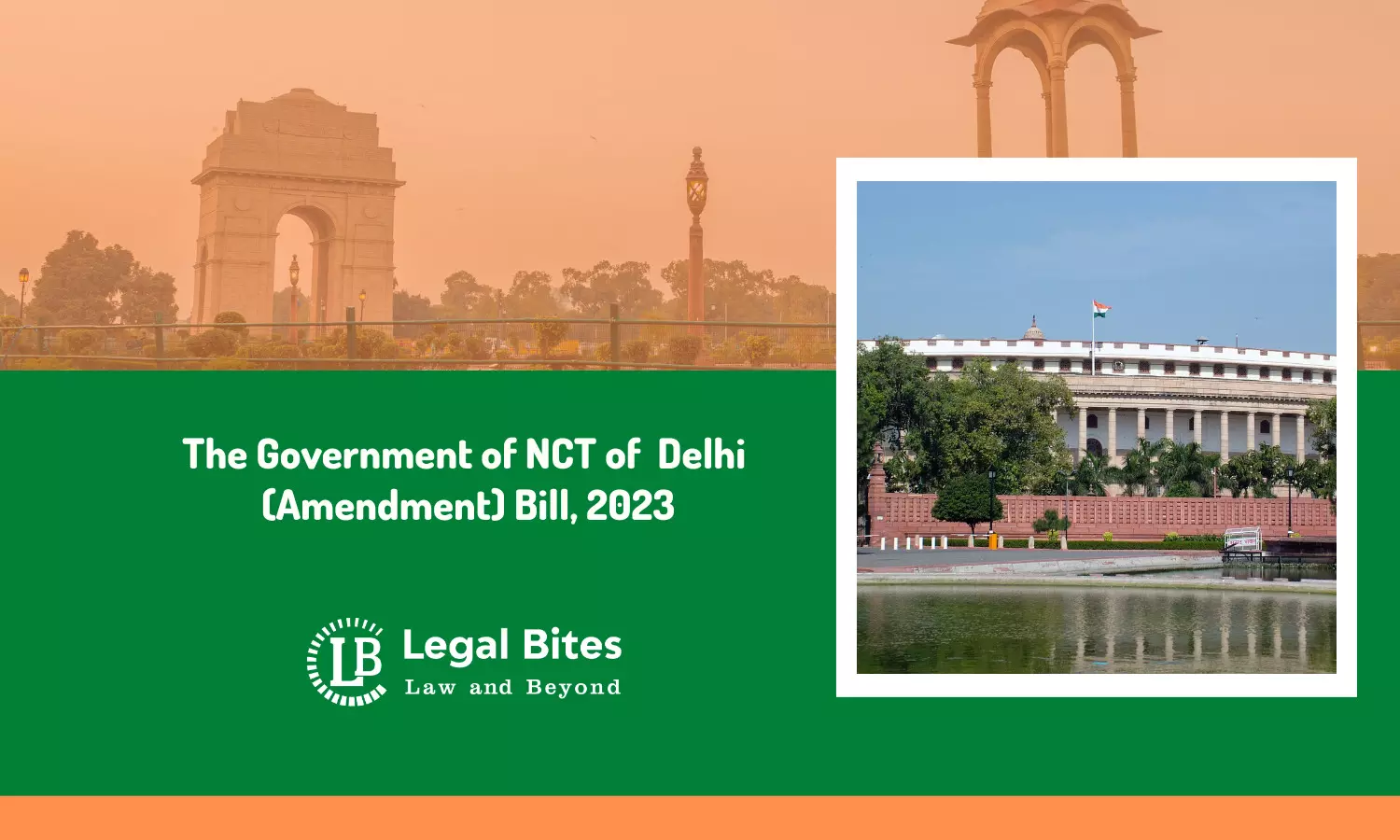The Government of National Capital Territory of Delhi (Amendment) Bill, 2023
The article 'The Government of National Capital Territory of Delhi (Amendment) Bill, 2023' intends to provide a holistic overview of the newly introduced Bill and analyse the key features pertaining to the same.

The article 'The Government of National Capital Territory of Delhi (Amendment) Bill, 2023' intends to provide a holistic overview of the newly introduced Bill and analyse the key features pertaining to the same.
The Government of National Capital Territory of Delhi (Amendment) Bill, 2023 (“Bill”), which was passed by Lok Sabha on 3rd August 2023 and was further passed by the Rajya Sabha on 7th August 2023, was introduced with the intent to maintain the democratic and administrative balance in the governance of the National Capital Territory of Delhi. However, it has escalated the long-lasting controversy of power-sharing between the Central Government and the Delhi Government. This article intends to provide a holistic overview of the newly introduced Bill and analyse the key features pertaining to the same.
Background
The President of India, as prescribed under the Constitution of India, administers the Union Territories (UTs) through appointed ambassadors, who are responsible for representing President in the respective UTs.
Based on the recommendations which were provided by the Balakrishnan Committee in the year 1987, Article 239 AA was inserted within the Constitution of India through the 69th Constitutional Amendment Act, 1991, prescribing the establishment of the legislative assembly and a council of ministers which was headed by the chief minister. While in other UTs, the powers of appointed ambassadors were merely restricted till tendering advice to the government elected, the LG of Delhi was vested with significant powers.
Since the year 2015, the Lieutenant Governor (“LG”) and the Delhi Government have been in a constant legal battle regarding who will have the ‘control’ over the services in the NCT of Delhi. In the recent judgment passed by the Hon’ble Supreme Court of India, the Hon’ble Court through its five-judge Constitution Bench held that the Delhi government is entitled to have control over the administrative services other than matters which are related to public order, police and land.
Pursuant to the judgment passed by Hon’ble Supreme Court, the Central Government introduced an ordinance, which excludes the “services” from the ambit of Delhi’s legislature, restoring the powers vested with LG for making decisions pertaining to the NCT of Delhi and prescribing the LG to consult the chief minister of Delhi only at his discretion.
Split Views of Central Government and State Government
While the Central Government has consistently maintained the view that Delhi is the national capital, therefore the same being the face of the country shall be must be controlled by Central Government and the said government shall have control over administrative services which includes appointments and transfers.
On the other hand, the Delhi government has been constantly opposing the transfer of powers with a view that the elected representatives of Delhi must have power over transfers and postings in the interest of federalism.
Key Features of the Bill
Amongst others, some of the key features of the Bill passed by the Parliament are as follows:
1) Establishment of National Capital Civil Services Authority:
The Bill prescribes the establishment of the National Capital Civil Services Authority (NCCSA), which will be responsible for making recommendations to the Lieutenant Governor of Delhi (LG) on the matter pertaining to services, which would include, but would not be limited to transfers and postings, vigilance, disciplinary proceedings, prosecution sanctions of Group A of All India Services (except Indian Police Service), and DANICS etc. The NCCSA will include the Chief Minister of Delhi (who will also be the Chairperson), the Principal Home Secretary of the Delhi government (who will be the Member Secretary), and the Chief Secretary of the Delhi government (who will be the member). The Principal Home Secretary and Chief Secretary for the said purpose will be appointed by the Central government, and every decision of the NCCSA will be based on a majority vote of the members present and voting. The quorum for a meeting of NCCSA would be two people.
2) Enhanced Powers to the LG (Lieutenant Governor):
The bill specifies that Lieutenant Governor is empowered to act on his sole discretion pertaining to the matters which are either outside the legislative competence of the Delhi Legislative Assembly, but which have been delegated to the LG, or those matters wherein he is required by law to act in his discretion or exercise any judicial or quasi-judicial functions.
Further, the Bill expands the discretionary role of the LG by granting him the power to approve/disapprove the recommendations of the NCCSA and return them for reconsideration. It is pertinent to mention here that in case there is a difference of opinion between the LG and the Authority, the decision of the former will be final and prevail.
3) Disposal of Matters by Ministers:
The Bill provides that the Minister of the Delhi government may issue standing orders for the disposal of matters brought to his attention and such orders could only be issued after due consultation with the Secretary of the concerned Department. However, it is also pertinent to note that certain matters must be submitted to the LG, through the Chief Minister and the Chief Secretary, seeking his opinion prior to the issue of any order. Such matters include, but are not limited to the following:
(i) the peace and tranquillity of Delhi,
(ii) relations between the Delhi government and the central government, Supreme Court, or other state governments,
(iii) summoning, prorogation, and dissolution of the Legislative Assembly, and
(iv) matters on which LG is to give an order in his sole discretion.
4) Duties of Secretaries:
Apart from the LG and Ministers, the Bill also prescribes certain duties for the Department Secretary. It is the duty of the concerned Department Secretary to apprise the LG, the Chief Minister, and the Chief Secretary, regarding matters which may lead to controversy between the Delhi Government with the central or any state government, the Supreme Court, or the High Court of Delhi.
Loopholes which require attention
Even though the Bill is introduced with the intent to create administrative balance in the governance, there are certain loopholes which require immediate attention such as:
[1] The NCCSA will be a three-member authority, out of which, two members will be the appointees of the Central Government. This can eventually lead to situations wherein the member can in effect outvote the chairperson, who will be the Chief Minister of Delhi.
[2] After the introduction of this bill, the LG would no longer be bound to act on the aid and advice of the Council of Ministers and if there will be any difference of opinion between the LG and the Chief Minister, the LG’s opinion will take precedence, which will not allow the elected government to have the power of decision making.
[3] The said bill allows department secretaries to bring certain matters directly to the LG, Chief Minister and Chief Secretary, without even consulting the concerned minister in the said regard. This will eventually break the usual chain of command, as the concerned minister would not be able to give his input in his own ministry.
Conclusion
While the Bill was introduced with a view to making drastic administrative changes in relation to the governance of the national capital, the same is being seen as an intent to challenge the majesty of the Hon’ble Supreme Court. However, it will be interesting to see whether it will actually be able to reform the governance of the national capital or merely act as an instrument to dilute the powers of the Delhi Government over services.
References
[1] The Government of National Capital Territory of Delhi (Amendment) Bill, 2023, Available Here
[2] Government of National Capital Territory of Delhi v. Union of India & Ors, Available Here
[3] Government of National Capital Territory of Delhi (Amendment) Bill, 2023, Available Here

